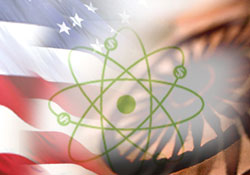The pressure is rising up these days for India to sign the CTBT in the world politics !!!

Here we look forward as to how can India play diplomacy with this regards !!!!
Test-Ban Treaty: India's Options
More than any other treaty, the CTBT is certain in
to curtail severely India's nuclear-weapon capability. Here are some of the
options available:
- Insist on a time-bound programme for elimination of atomic weapons which the five nuclear powers possess.
- If they don't agree, blame them for sabotaging the
treaty and proceed to weaponise its own capability. If they agree, sign on
and proclaim a major victory.
- Conduct
a few tests involving nuclear explosions to develop India's weapon
capability while assuring the world that it would sign the treaty. The
international fallout of such a move would be severe and India's
policy-makers would have to evaluate whether the country can afford it.
- Use the signing of the treaty to wrest major concessions for India from the nuclear powers.
- One option is to ensure a permanent seat in the Security
Council. From the US, for instance, India could insist that it keep off
Kashmir, transfer critical technology in many areas, give trade
concessions, etc.
************************************************************************************************************
Additional Reading


What are the Hyde Act and
the 123 Agreement?
- Under Section 123 of its Atomic Energy Act, the United
States can enter into civilian nuclear trade only with those countries
that have signed the NPT and CTBT.
- India has signed neither treaty.
- Further, after its first nuclear test in 1974, the
United States had placed a ban on the supply of nuclear fuel and
technology to India.
- In order to sign the present deal, the section 123 of
the Atomic Energy Act needed to be amended.
- The Hyde Act 2006, a domestic Act of the United States,
was accordingly brought in to amend this Section and provide a legal
framework for a 123 Agreement with India. With this agreement India
becomes the only non-NPT/CTBT signatory to have signed the 123 Agreement
with the United States.
Who are the Nuclear
Suppliers Group?
- Nuclear Suppliers Group (NSG) is a 45 nation body
concerned with reducing nuclear proliferation by controlling trade in
nuclear fuel and technology.
- Their policies had so far kept India out of bounds of international
nuclear trade as it has not signed the NPT and CTBT.
- Some countries in the NSG had misgivings about giving
India the unprecedented waiver of carrying on international civil nuclear
trade even without signing the NPT, but the approval finally came through
keeping in view India's strong non-proliferation records, and its
voluntary declaration of "no first use" of nuclear weapons.
